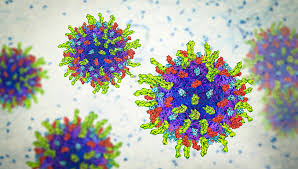Genital herpes is common sexually transmitted infection. Often the virus manifests itself in a very mild form or is asymptomatic. At the initial stage of the disease, herpes rashes are often mistaken for other skin diseases, and for this reason, patients do not even realize that they are carriers.
How does it manifest?
The onset of the disease is the most serious in terms of symptoms; signs appear within 2 weeks after infection and can last up to several weeks. The appearance of blisters is preceded by itching, tingling and muscle pain. The classic symptoms of genital herpes are characteristic blisters that leave painful ulcers. The sores take about 10 days to dry, crust, and heal. Blisters appear near the area of infection, for example, in the genital area, rectum, buttocks, thighs.
Other symptoms include high fever, headache, difficulty urinating, urine leakage , and swollen lymph nodes in the groin area. Symptoms may persist for up to three weeks. If the first manifestation is mild, subsequent manifestations will be almost unnoticeable.
Recurrence of herpes: how often?
For most people, the virus can reactivate and cause relapses once a year. On average - 4 times a year. The most typical cycle is 6-10 relapses in the first year with a progressive decrease in subsequent years. The herpes simplex virus remains latent in some of the body's nerve cells throughout life.
Sometimes the virus, even though it remains active, does not cause visible sores or symptoms. During this period, small amounts of the virus are present near the sites of first infection, in the mouth, on the penis, in the vagina, or on subtle sores. You may not be aware of the reactivation of the virus and infect your partner during sexual intercourse.
What are the risk factors?
Although subjective, the following factors contribute to the appearance of new manifestations: sunlight, particularly vigorous sexual intercourse (due to mechanical stress on the mucous membranes), fatigue, weakened immune system, surgical interventions in the genital area, stress.
Genital herpes infection usually does not cause serious health problems, but in some patients whose immune systems do not work properly, outbreaks of genital herpes can be unusually severe and long-lasting.
Genital herpes does not reduce a couple's chances of conceiving, but there is a risk associated with pregnancy. There is a possibility of transmission of the virus to the newborn during childbirth. (Genital herpes affects nearly one in five women.) Some cases of neonatal herpes can be fatal.
What to do?
A diagnosis of genital herpes can have negative emotional consequences for the patient and their partner, whether symptoms are present or not. Proper therapy can help you cope with the disease, recurring episodes and fertility problems. Bogolyuby MC specialists can prescribe antiviral drugs to relieve symptoms and prevent future outbreaks ( acyclovir , famvir , talavir , etc.). Blocking symptoms can reduce the risk of virus transmission.
To prevent infection, it is important to avoid sexual intercourse (vaginal, oral or anal), even if it has been protected from the first onset of genital symptoms until they disappear completely. Using condoms reduces the risk of infection, but, unfortunately, does not completely eliminate it.



















